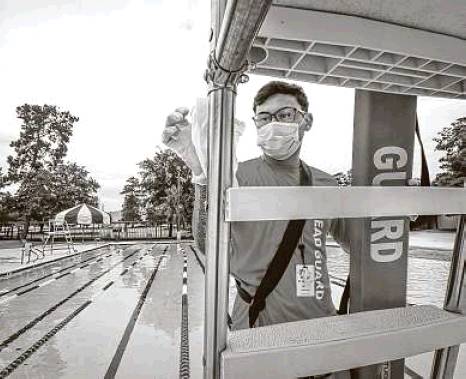Are swimmers diving into a high-risk pool?
By Julie Garcia STAFF WRITER
Atypical summer in the South has any combination of the following: swimming in the Gulf of Mexico, floating the river and splashing at pool parties.
But COVID-19 has changed everything this year, including the tradition of taking a dip in the swimming pool with friends.
Will chlorine save you from contracting the novel coronavirus?
Maybe — but you have to continue to practice social distancing and hand hygiene to ensure safety around the pool.
Chlorination in swimming pool water kills viruses, and scientists do not believe COVID-19 is an exception to that rule, said Dr. Janak Patel, infectious disease specialist and director of Infection Control and Healthcare Epidemiology at the University of Texas Medical Branch.
Longtime studies have shown chlorine is effective in killing germs in water — it’s why the chemical was first used in a swimming pool in the early 1900s.
According to the Centers for Disease Control and Prevention, there is no evidence the virus that causes COVID-19 can be spread to people through the water in pools, hot tubs or water playgrounds.
“Additionally, proper operation of these aquatic venues and disinfection of the water (with chlorine or bromine) should inactivate the virus,” the CDC stated.
Chlorine’s disinfectant properties only work in a wet state, Patel said. When you get out of the pool and wash your hands and body with soap, the chlorine dries and becomes ineffective.
While there’s a minimal risk of transmission in bodies of water, Patel said the bigger problem is the other social interactions that happen around the pool.
These risks can be mitigated by staying home and spending time with people who live in the same household.
While many apartment complexes have reopened their shared pool spaces and workout facilities, congregating in large groups is not advised by the CDC.
Unless social distancing of 6 feet or more can be maintained, people should avoid group events, gatherings or meetings both in or out of the water unless they live together.
The CDC recommends asking parents to consider if their children are capable of staying at least 6 feet away from people they don’t live with before taking them to a public aquatic venue, such as a pool or splash pad.
The Texas Department of Health and Human Services advises people to avoid being in a group larger than 10 individuals and to minimize in-person contact with others not in their household. When social distancing of 6-feet or more is not feasible, wear a face covering or face mask and wash hands frequently.
If you’re using a communal pool at a hotel, resort or apartment complex, it’s best to go when it’s not crowded.
Staff writer Emma Balter contributed to this story. julie.garcia@chron.com | twitter.com/reporterjulie
